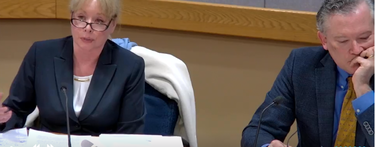Bohl believes tenants, not just landlords, should be notified on land use
GUILDERLAND — After a heated discussion, the town board last Tuesday scheduled a May 17 public hearing on a local law that would change the way notices are provided.
The debate turned on whether just property owners should be notified of hearings, as the draft states, or apartment dwellers as well.
The current local law states that notice shall be given for meetings of the town, zoning, and planning, assessment, and conservation boards as well as for the conservation advisory council.
Many of the changes in the proposed local law are small updates, such as adding email to telephone or mail delivery of notices.
The most substantive change is adding supplemental notices to be sent before public hearings.
Property owners within 750 feet of a property boundary subject to a public hearing for land use activity — such as site-plan approval, special-use permits, use variances, area variance for properties not in residential districts, planned unit developments, rezones, or subdivisions — are to receive a mailed notes at least 10 days or a personally delivered notes at least five days before the hearing.
Similarly, for public hearings on area variances for properties not in residential districts, notice is to be given to the owners of tax parcel lots, as determined to the town assessor’s most recent record, located within 500 feet of the property boundary of the parcel subject to the public hearing.
Further, the bill states that emailed notices will be sent to people who subscribed for such notices through the town website at least seven days before the meeting.
The bill states further that, if a notice is not received or is undeliverable by the post office, or if an email isn’t received, the failure to have received the notice is not grounds for challenging the determination made at the meeting.
At the April 5 town board meeting, Councilwoman Laurel Bohl said that she and councilwoman Amanda Beedle and Christine Napierski, who co-sponsored the bill, all felt residents needed more notice individually if something is being built right next to them.
Councilwoman Rosemary Centi took exception to Bohl’s use of the word “co-sponsor.”
Barber agreed, saying it was not fair to Centi or himself. “Collectively, I think the town board wants to update the notification and I think it was very important that Rosemary did raise some concerns early on,” he said.
Barber also said that the 500- and 750-foot notifications are already in practice.
“It shouldn’t be a courtesy; it should be in the code,” said Bohl. She also said, “We did a lot of work on it.”
“We all did a lot of work on it,” countered Barber.
“We all contributed,” said Napierski.
Bohl, Barber, and Napierski are all lawyers.
Bohl went on to state her concerns about wording that had been removed by town staff. She had wanted people who rent apartments to be notified, not just property owners as the bill states.
“I ran as the voice of the residents,” said Bohl, reading from prepared remarks.
Although the town board is made up entirely of Democrats, Bohl’s support had come initially from a grassroots citizens’ group that questioned rampant development in town. Napierski had gotten on the ballot two years after Bohl, last November, after winning a primary challenging the choices of the Democratic Committee. She and Beedle, a committee choice, then campaigned together.
Bohl said that tenants are “a fast-growing group” of residents in Guilderland and are as important as homeowners.
Apartment-dwellers, she said, tend to fall in three categories: young people just starting out, people living on low incomes who can’t afford a home, or seniors who have given up their homes. Some believe that a number of apartment dwellers are minorities, she said.
Bohl said it is unfair to draft a law that would “deliberately exclude” these groups. “Tenants are residents of the town too,” she said. “People who live in apartments. That’s their home … no less than people who are fortunate enough to be able to afford and own land and live in houses …
“The effect of light, noise, traffic, loss of viewshed, cutting of trees, elimination of green space next door to them is no less important in its impact on tenants’ homes than it is on private landowners’ homes.”
Bohl said further that “prejudice against those who don’t own land” has roots in history. Of landlords and tenants, she said, “Both, for me, have equal rights.” Leaving tenants out of the town’s notification process, Bohl said “appears to be discrimination to me … a denial of equal rights.”
She also said that landlords have no incentive to inform their tenants of town meetings or hearings as tenants might consider moving to another complex to avoid development nearby.
Bohl questioned for what reasons the inclusion of tenants for notification was struck from the bill. She said it couldn’t be cost since applicants, not the town, pay for notification. She said the process of informing tenants wouldn’t be too hard since all apartment complexes are within a 15- or 20-minute drive of the town hall.
Bohl urged apartment-dwellers to let her know if they want to have notification of tenants included in the new law.
“I’m willing to fight for you …,” said Bohl. “This is your chance to let your voice be heard.”
Beedle, who had formerly worked at the town hall, said the program that generates mailing notices does not contain individual unit addresses so it would be cumbersome to inform apartment dwellers.
At the meeting’s opening public-comment period, Guilderland resident Gerd Beckmann had urged the town to buy new software for its building department. “People are not getting and receiving notices,” he said.
Beedle also said she has two grown children who live in a Guilderland apartment complex next to a residential area. If someone in that residential area wanted to put a shed in his backyard, it would cost an extra $300 for him to inform all 440 apartment units, she said, calling it a burden.
Some complexes use email portals to let residents know about meetings, Beedle said, and named other ways to learn about meetings like Nixle, Facebook, Twitter, and the town’s website.
“It’s not difficult at all,” Bohl responded, of informing tenants and not just landlords about meetings. “It’s a matter of fairness.”
“You read your speech …,” said Barber. “I find those terms to be offensive, unnecessarily so.”
He said Bohl had made it seem as if people in Town Hall are trying to deliberately discriminate against apartment dwellers.
“That is just not true,” he said. “There are practical reasons. There are other solutions to this problem.”
“The practice, Peter,” Bohl clarified on what she believes is unfair. “I’m not talking about people.”
The hearing on the local law will be held at 7 p.m. on May 17 at the Guilderland Town Hall.



